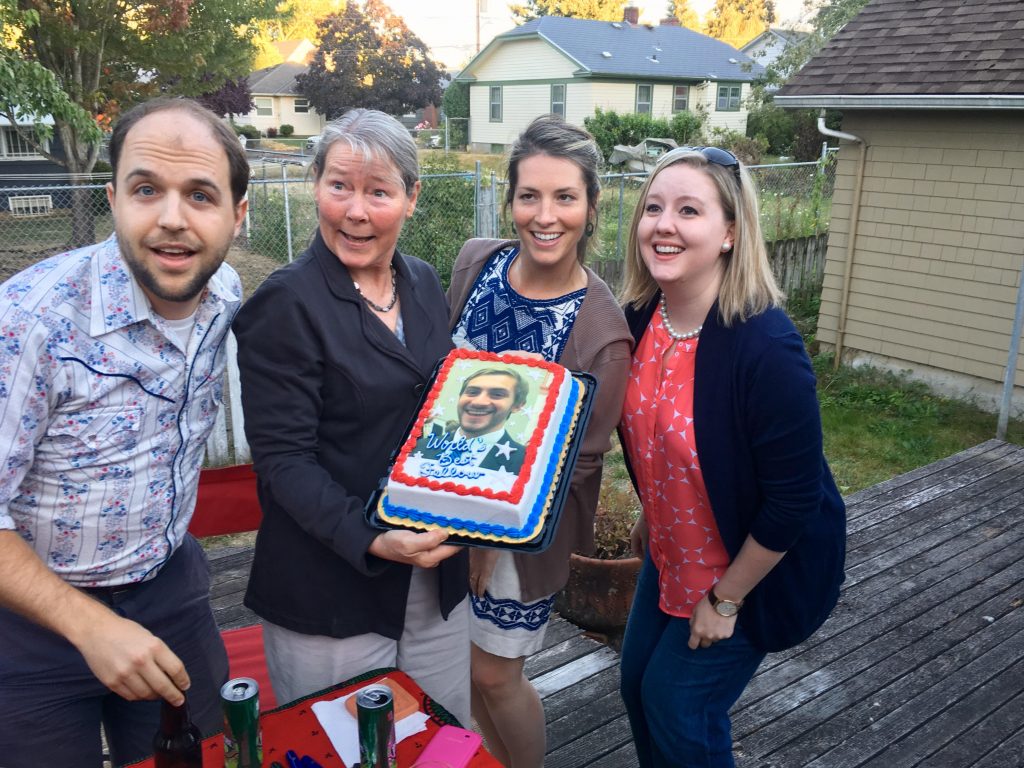Friday, July 28th will be my final day at Healthy Democracy. I’ve been here less than three years, and in that time I’ve seen two offices, four Citizens’ Initiative Reviews in four states, colleagues come and go, the birth of new programs, the spark of international excitement about the Citizens’ Initiative Review, and the sudden popular interest in the idea of healthy democracy, writ large.
One grossly inadequate way to put it is that I’m leaving a fantastic career, a fulfilling workplace, and a thriving community to start over as a student. But were it not for the work I’ve done here and the ideas I’ve been exposed to by my colleagues in this field, I would never have pursued a career in the law. My objectives (justice, liberty, equity) are the same, but I’m trying out different means.
Since I’m leaving, I hope you’ll entertain a few sappy goodbyes.
To my colleagues at Healthy Democracy:
Robin, your impact on me is immeasurable and indelible. I hope to bring to my life’s work a fraction of the integrity that you bring to yours. Thank you for entertaining my larval ideas and for treating me and everyone else you encounter with unbounded respect. I love you dearly. Linn, you are a moral compass, an intellectual sparring partner, and a creative tour de force. I hope Healthy Democracy will benefit from your talents for years to come. You are a true friend. Robin and Linn, you two are much more than colleagues. You’re family to me. Folks, if you think your workplace is great, you have no idea. I really am a fool to leave.
I am glad that you two are carrying this work forward. The Citizens’ Initiative Review is a gem in the world of democratic reforms, and I cannot wait to see it improve direct democracy around the country and, perhaps, the world. I owe each of you a debt of gratitude for helping to shape my thoughts about what our democracy is and what it can become. Our programs are in very, very good hands.
To my fellow democracy innovators:
Colleagues in the field of democracy and deliberation, you are doing incredible, important work. I implore you to see the forest for the trees. Seek out the root causes of our democracy’s issues and make sure that your efforts get to fixing those–not just mitigating their symptoms.
Increasing trust in government, improving civility, and depolarizing individuals–a few goals of our field–are aimed at the person-level symptoms of a deeply and systemically unresponsive democracy. As you do the unending work of democracy innovation, I hope you will seek the points of genuine leverage for your interventions. Study the structural deficiencies in our democracy: our method of electing representatives through single-member districts and the resulting two-party dominance; the exacerbating impacts of partisan and racial gerrymandering; our country’s deep commitment to white supremacy; and the lack of consequences to unresponsive elected officials. Asking people to trust such a government, talk with one another nicely, or demand that their legislators be polite will, unfortunately, not address these root deficiencies. In fact, I fear it may mitigate the symptoms while the roots continue to rot.
Of course, I don’t mean to say that we shouldn’t do work at the level of the individual or that relationships aren’t the key to change. As Wendy Willis says, we in the dialogue and deliberation world promote “disease resistance.” We may not always be the most direct pathways to fixing structural problems, but we can help build immunity for future threats. Through social capital and civic literacy work, we shepherd efforts in our communities, states, country, and world that distribute information about what a healthy democracy is and isn’t. Through this work, we can open the eyes of other parts of the system to the structural deficiencies that ail us. This work is worthwhile. And, it shouldn’t be done with blindness to systemic power issues or at the expense of greater structural reforms.
And as a former scientist, I must plead: please evaluate your work using the most rigorous methods possible. Only through testing the efficacy of our programs and assessing the true scope of their impact can we know what works and what doesn’t. Funders, you still give a lot of money to people who claim their processes are good based on theoretical assumptions. Make them test those assumptions and show you the results! (One of the great assets we at Healthy Democracy have is our strong relationship with independent evaluators who tell us the strengths and weaknesses of every CIR we run. But we’re unusual in the field.)
Also remember, doing healthy democracy work in a time of great political upheaval means that our thoughts about what’s important, effective, and true can change from day to day, moment to moment. What we find important now may be very different from what we thought yesterday or will think tomorrow. We all deserve a little grace in how we think about ourselves and our American democracy.
To my fellow Americans:
The concept of healthy democracy is on a lot of minds as we move into an era of polarization and partisan rancor that many feel is unprecedented. Others think of the Civil War and the promise and tragedies of Reconstruction and feel the echoes of history. The great news is there are thriving liberal democracies around the world from which we can learn a great deal! No longer do we have to look only at our own history or the deeply flawed ancient Athens to discern what democracy can and should look like.
Please don’t forget that American democracy isn’t inevitable, as if you even could these days. Don’t assume that we’re the best at democracy, as I did for too long. Keep your eyes and ears open. The United States may not be the most fertile soil to learn about the promise of democracy. Look instead to places where democracy is fresh; where they have learned from our mistakes; where they remember a bad alternative and are grasping democracy with their fingernails because it is precious and will slip away if they let it go even for a moment.
[divider style=”dotted” height=”2px” color=”#eeeeee”]
My journey continues next month at the University of Virginia School of Law, where I will study alongside some of the most vibrant and collegial people in the country. There is so much work to do to protect civil rights and civil liberties! While the legal field is not somewhere I’ve been drawn to until recently, it feels like the place where I can do the most good. I look forward to staying involved with Healthy Democracy as a member of the national advisory board, and to occasionally contributing my thoughts on the HD blog.
Thank you to everyone who has walked alongside me these last couple of years. I will keep you in my heart. Please stay in touch. You can always reach me at jessie dot conover at gmail dot com.
With love and hope,
Jessie
*Robin Teater says these words by Terry Tempest Williams almost constantly. I think she’s onto something.
**A note on law school. It’s not a good idea for most people. It (probably?) makes sense for me because I’ve been in public service long enough to know that I want to stay in it, despite the prospect of earning about as much money as I do now with a lot (a lot) more debt. I also got into a good enough school with a big enough endowment that I’ll have help paying my loans as long as I say in public service. That said, law school is obscenely expensive and most schools don’t have very good employment outcomes, bar passage rates, or loan repayment assistance. If you’re thinking of going to law school, please check out the statistics and reports at Law School Transparency.


